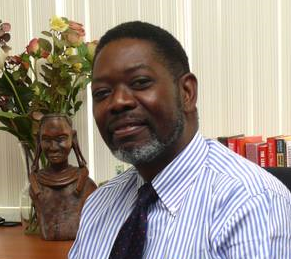Good Governance Africa head Chris Maroleng
With many businesses across the world being pressured to integrate environmental, social and governance (ESG) principles into their daily operations, the African mining industry must shift its business strategy to focus on ESG performance and increased returns on stakeholder interests, rather than on pure shareholder interest. This was according to a panel of experts speaking at the Mainstreaming ESG performance in Fragile Mining Jurisdictions webinar on 13 April 2022. The webinar was hosted by Good Governance Africa (GGA) in partnership with Mail & Guardian, and with GGA Executive director, Chris Maroleng, moderating the panel discussion.
 Deji Haastrup
Deji HaastrupAccording to Maroleng and the speakers, the importance of ESG performance in the mining industry is critical for mining activities to be successful in the long term. “The extractive business is an intrusive business, and by its very nature and necessity, it has to devise a process of managing risks and building resilience,” said Deji Haastrup, Chief Consultant and CEO of Strategic Communications Solutions. “The business goals and stakeholder interests can be integrated, and they are integral to the long-term success of mining activities.”
Stakeholder interests and inclusive communication
According to Haastrup, the extractive industry must focus on improving its returns on stakeholders’ interests. He defines stakeholders as “key groups in society who may have a direct, or not so direct, impact on the success of the business”. These groups include governments, citizens, employees, trade unions and civil society organisations; their attitude toward the mining industry impacts the performance of specific firms operating within the industry in any given jurisdiction.
An intent focus on incorporating ESG practices plays an integral part in securing better returns for stakeholders, and thus for the future of the mining industry, according to Adam Matthews, the Chief Responsible Investment Officer of the Church of England Pensions Board. “If ESG is simply a tick-box exercise, then we’re going to fail,” said Matthews. “It’s not going to be easy, but the prize is that if we can work together on this, you can get to a sector that we all have confidence in, that will meet the needs of society in the low carbon transition, and it will be one that will be profitable for the owners, countries and societies in which they operate.”
 Tracey Cooper
Tracey CooperRealising this kind of ESG integration can, however, only stem from open engagement with stakeholders, according to Tracey Cooper, Executive Director of Mining Dialogues 360°. “Good stakeholder engagement is about listening. It’s about removing your preconceived ideas and your prejudices and really listening, hearing what people are saying to you,” Cooper commented. She stated that good quality engagement requires an understanding of the complex context from which stakeholders view the industry. This was confirmed by Haastrup, who commented: “When local communities ask the questions they ask, they’re asking from the perspective of history.”
The price of faulty ESG integration
According to Maroleng, ESG considerations have been ignored for the most part throughout history. “Unethical firms, unfortunately, prefer to externalise social and environmental costs, and deterrence against such behaviour was seemingly inefficient. This led to wide-scale environmental degradation and abuse of human rights.” Maroleng used this as a segue to direct the conversation towards how ESG principles may fruitfully apply in difficult operating contexts.
The impact of offloading negative externalities, for instance, can be seen acutely in fragile mining jurisdictions such as Mozambique and Zimbabwe. In Mozambique, the stakeholders — as Haastrup defined them — are often viewed as nuisances, according to Dr David Matsinhe, a researcher at Amnesty International. “When these community consultations happen, they are not meaningful. They’re not genuine; they’re often manipulated in favour of certain political elites, in partnership with the mining companies.” This creates a surplus of people in the mining areas who can’t be absorbed into the industry and choose to take destructive paths in response, according to Matsinhe.
 David Matsinhe
David MatsinheThe situation in Mozambique is very similar to the one in Zimbabwe, according to Dr Ibbo Mandaza, Executive Chairman of the Southern African Political Economy Series: “Mining in Zimbabwe has been a foreign imposition at the point of a gun from the very outset. Up to now, it is still the corporations that were established at the turn of the 20th century who still dominate mining in Zimbabwe.”
According to Maroleng, the situations in Zimbabwe and Mozambique showcase why there is a real need for better management of ESG risks in the African mining sector. Cooper echoed this sentiment and again brought emphasis to the importance of dialogues between stakeholders, including communities: “The problem is that the ongoing weakness of these consultative processes or dialogues with community stakeholders translate into weak implementation. And so, we’re continuing to perpetuate the cycles of discontent, distrust and increasing protests that are taking place.”
Where to begin
During the discussion, Busisipho Siyobi, the lead researcher in the Natural Resource Governance Programme at GGA, outlined three best practices that could improve management of ESG risks. Siyobi stated that the businesses’ issues-identification process needs to be informed by the communities’ needs and the developmental goals that the community wishes to achieve. Secondly, she said that the assessment and prioritisation of issues in these mining communities should be led by the context of the community and not by a “one size fits all” approach.
Lastly, Siyobi again placed emphasis on stakeholder engagement: “I think it is integral that there is an appropriate identification of all relevant and interested stakeholders who will be affected by ESG performance by mining companies.”
Matthews said that if the mining industry manages to effectively cooperate with its stakeholders and focus on mainstreaming ESG performance, the future of the industry and the fragile contexts in which it operates will be bright.
— Wessel Krige